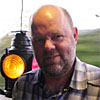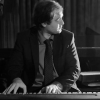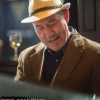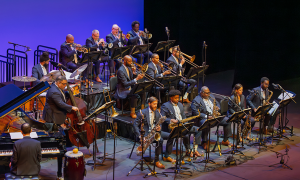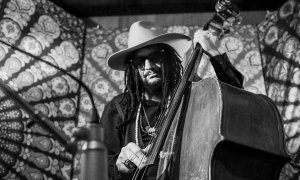Home » Jazz Articles » Live Review » At Monterey Jazz Festival 67, Jazz Gospel According to a New Head
At Monterey Jazz Festival 67, Jazz Gospel According to a New Head

Courtesy Josef Woodard
For this edition of MJF, new director Darin Atwater achieved his stated goal of continuing the Jackson approach, presiding over a healthy checklist of artists with appeal for a wide demographic of ear spaces and tastes, mainstream and left of center.
Monterey, CA
September 27-29, 2024
Getting a semblance of a summarizing angle on a densely-programmed jazz festival, which the 67th Monterey Jazz Festival most certainly was, can be tricky business. The equation gets more complex with a festival geared towards covering many genre and sub-genre bases within the rubric of jazz. But to these ears, one of the strongest memories came near the very end of the weekend-long feast on the Monterey County Fairgrounds, when James Brandon Lewis' Red Lily Quintet laid out its free-lined and elegant tribute to the profound musical inspiration of Mahalia Jackson.
Aside from its inherent virtues and invitations to wonder and free play in the margins (especially from the visionary tenor saxophonist Lewis and cornetist Kirk Knuffke), the Red Lily's gospel spirituals-rooted agenda tied in neatly with a running theme in this festival's emphasis on shades of gospel. Lewis offered the most liberated take on things gospel-related, a late-breaking riff on sounds offered up by Mavis Staples, the Blind Boys of Alabama and the bonafide gospel choir business of Donald Lawrence & Company.
Blame—and credit—the new boss in town. This year's MJF model came equipped with built-in anticipation and expectation, as the first year of a new director in charge: Darin Atwater, a musician-composer-facilitator from the Washington D.C. area, is only the third director of this deeply-entrenched festival, following founder Jimmy Lyons and the luminous 32-year run helmed by Tim Jackson. As Atwater has stated, his intention is not to radically alter the MJF direction, but to perpetuate the Jacksonian aesthetic, while gently guiding the programming into new areas of stylistic interest, focus and inclusiveness.
For this edition, Atwater achieved his stated goal of continuing the Jackson approach, presiding over a healthy checklist of artists with appeal for a wide demographic of ear spaces and tastes, mainstream and left of center.
In the main arena's schedule, the big ticket audience lure included "Symphonic Eastwood" (Kyle Eastwood leading the Monterey Symphony in a tribute to music from the films of his father, and longtime festival champion Clint, sitting proudly in the seventh row), veteran fusioneer Stanley Clarke (whose '70s heyday ran counter to the conservative programming of the Lyons era), another powerfully virtuosity-affirming set by young firebrand vocalist Samara Joy, Hiromi's highwire post-fusion act, and ever-nimble Robert Glasper's commissioned set, featuring vocalist YEBBA. Joshua Redman, part of the sizable club of musicians whose link to the festival extends back to his high school days, as part of the festival's rich educational component, showed up with his project featuring supple vocalist Gabrielle Cavassa. Their inventive take on "Hotel California," for one, served up a new flavor of multicolored champagne on ice.
One of the undersold arena acts showed up early on Friday, before many had arrived, in the form of the impressive SFJAZZ Collective. The rotating group, now directed by Terrence Blanchard, celebrated its notable 20th anniversary in a tight, smart set in which tenor saxophonist Chris Potter casually pulled his trick of stealing the show, with musicality vs. hubris. Another arena bedazzler was Somi, the potently-gifted African-American vocalist whose stunning and hymn-like "Holy Room" inspired a mid-set standing ovation. She deserves a much brighter public spotlight, in jazz and beyond.
And yet, despite the strengths of the arena big top, some of the more musically enriching and challenging fare showed up on the smaller stages around the vast property, tucked in between the allure of BBQ and Indian food, assorted vendors and a large merch/artist signing space.
Multi-faceted pianist Jason Moran used his artist-in-residence position wisely, paying traditional respects with his Ellington tribute with the Next Generation Jazz Orchestra, diametrically different than the festival's most adventurous moment, when Moran took over the Garden Stage (now duly named the Tim Jackson Garden Stage) with his trio with drummer Marcus Gilmore and live electronics shape-shifter BlankFor.ms. Musical materials presented by the pianist and drummer, including bebop flights and impressionistic asides, were manipulated in a real-time house-of-mirrors-like fashion by the gaming electronician in the middle, to fascinating and hypnotic ends.
Moran showed up on the fairly new West End Stage with his venturesome and longstanding trio Bandwagon in taut alliance with drummer Nasheet Waits and bassist Tarus Mateen. For this occasion, the trio made the rare exception of including a horn player—for a specific cause: the fine young trumpeter Akili Bradley, now based in Brooklyn, was raised in Monterey-adjacent town of Seaside and came up through the ranks of the MJF educational programs. Moran's magnanimous cross-generational gesture nodded to the hosting organization's legacy, but also made for a fruitful and empathetic generational integration.
As it happened, one of the strong themes of this festival involved unique and mold-breaking trios performing on the West End Stage. On Friday night, the wizardly dynamo alto saxophonist David Binney—originally from Ventura, California and a longtime New Yorker who has returned to Los Angeles and shaken up that scene—led his bravura Action Trio, with longtime ally, muscular-mindful drummer Zach Danziger and assured bassist Pera Krstajic. Also from the LA contingent, frequent Monterey visitor, pianist Gerald Clayton guided his own flexible trio on Sunday night (after directing the Next Generation Orchestra at noon that day).
A pair of trios-deserving-wider-recognition also alighted the West End stage, demonstrating the powers of the three-for-one format to transcend traditions and explore new vistas and collective voices. Harriet Tubman, featuring the painterly, expansive and never bullying electric guitarist Brandon Ross with bassist Melvin Gibbs and drummer JT Lewis, irradiated the misty night air with its fluid left-of-fusion textures. Ross remains a poet of the electric guitar, with his warmly distorted tone, elegantly angular lines and thoughtful phrasing, delicately brushed by subtle gestures on his vibrato bar—joining the slim ranks of such players as the late, great Jeff Beck, who embody the subtleties of whammy bar eloquence.
Power trio Tarbaby—powered by technical bravado but also an inspired spirit of collective probity—kicked off the Sunday agenda with its own unique musical menu. Stellar pianist Orrin Evans proved why he's one of the finer and more oddly under-sung players on the scene, and masterful bassist Eric Revis and drummer Waits (fresh off of his Bandwagon stint) sidled through varied terrains of punk Monk, elastic balladry, Andrew Hill's "Reconciliation" and free zoning, with its uniquely dialed-in interactive aplomb.
From another corner of the spectrum, vying for the award for best party stoking set of the festival, Don Was (of Blue Note Records fame and much more) led his fascinating new project, the Pan-Detroit Ensemble, featuring some of Motor City's finest musicians. The ensemble—including established tenor saxophonist/flutist David McMurray and the strikingly fine young vocalist Steffanie Christ'ian—stretched over and groove-lined a diverse setlist, with ramparts of Grateful Dead repertoire, a soul-stewed take on Hank Williams' "I Ain't Got Nothin' but Time," a blast from Was' gonzo past—Was (Not Was)' "I Feel Better than James Brown"—and the anthemic nugget of Curtis Mayfield's "This is My Country."
For the record, the last sound/song we heard at MJF 67 came in the arena, when during Keyon Harrold's positivity-fueled "Foreverland" set, vocalist PJ Morton corralled the remaining crowd into a hearty singalong of the Bee Gees' "How Deep is Your Love?" It had the feel of a secularized gospel-fired moment, warming up the cooling Monterey air bumping up against midnight.
The Atwater era has begun in Monterey, and the vital signs are well in order.
Tags
Festivals Talking
Don Was
Josef Woodard
James Brandon Lewis
Mahalia Jackson
Kirk Knuffke
Mavis Staples
Blind Boys of Alabama
Donald Lawrence & Company
Darin Atwater
Jimmy Lyons
Tim Jackson
Kyle Eastwood
Clint
Stanley Clarke
Samara Joy
Hiromi
Robert Glasper
Yebba
Joshua Redman
Gabrielle Cavassa
SF Jazz Collective
Terrence Blanchard
Chris Potter
Somi
jason moran
Next Generation Jazz Orchestra
Marcus Gilmore
BlankFor.ms
Bandwagon
Nasheet Waits
Tarus Mateen
AKILI BRADLEY
David Binney
Zach Danziger
Pera Krstajic
Gerald Clayton
Harriet Tubman
Brandon Ross
Melvin Gibbs
JT Lewis
jeff beck
Tarbaby
Orrin Evans
Eric Revis
Andrew Hill
Pan-Detroit Ensemble
David McMurray
Steffanie Christ'ian
Grateful Dead
Curtis Mayfield
Keyon Harrold
PJ Morton
Bee Gees
PREVIOUS / NEXT
Support All About Jazz
 All About Jazz has been a pillar of jazz since 1995, championing it as an art form and, more importantly, supporting the musicians who make it. Our enduring commitment has made "AAJ" one of the most culturally important websites of its kind, read by hundreds of thousands of fans, musicians and industry figures every month.
All About Jazz has been a pillar of jazz since 1995, championing it as an art form and, more importantly, supporting the musicians who make it. Our enduring commitment has made "AAJ" one of the most culturally important websites of its kind, read by hundreds of thousands of fans, musicians and industry figures every month.

